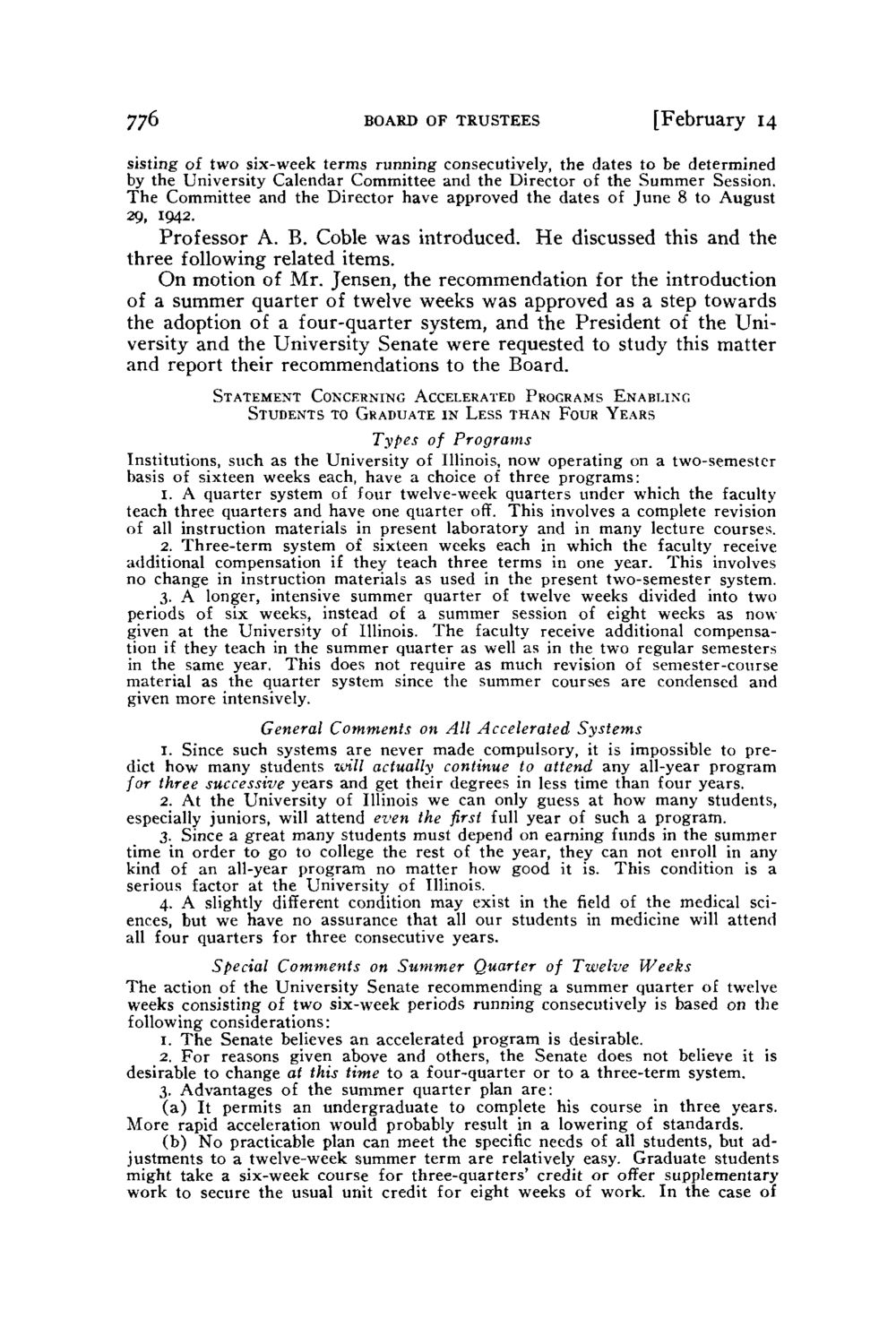| |
| |
Caption: Board of Trustees Minutes - 1942
This is a reduced-resolution page image for fast online browsing.

EXTRACTED TEXT FROM PAGE:
776 BOARD OF TRUSTEES [February 14 sisting of two six-week terms running consecutively, the dates to be determined by the University Calendar Committee and the Director of the Summer Session. T h e Committee and the Director have approved the dates of June 8 to August 29, 1942. Professor A. B. Coble was introduced. He discussed this and the three following related items. On motion of Mr. Jensen, the recommendation for the introduction of a summer quarter of twelve weeks was approved as a step towards the adoption of a four-quarter system, and the President of the University and the University Senate were requested to study this matter and report their recommendations to the Board. STATEMENT CONCERNING ACCELERATED PROGRAMS ENABLING STUDENTS TO GRADUATE I N L E S S THAN FOUR YEARS Types of Programs Institutions, such as the University of Illinois, now operating on a two-semester basis of sixteen weeks each, have a choice of three programs: 1. A quarter system of four twelve-week quarters under which the faculty teach three quarters and have one quarter off. This involves a complete revision of all instruction materials in present laboratory and in many lecture courses. 2. Three-term system of sixteen weeks each in which the faculty receive additional compensation if they teach three terms in one year. This involves no change in instruction materials as used in the present two-semester system. 3. A longer, intensive summer quarter of twelve weeks divided into two periods of six weeks, instead of a summer session of eight weeks as now given at the University of Illinois. T h e faculty receive additional compensation if they teach in the summer quarter as well as in the two regular semesters in the same year. This does not require as much revision of semester-course material as the quarter system since the summer courses are condensed and given more intensively. General Comments on All Accelerated Systems 1. Since such systems are never made compulsory, it is impossible to predict how many students •will actually continue to attend any all-year program for three successive years and get their degrees in less time than four years. 2. At the University of Illinois we can only guess at how many students, especially juniors, will attend even the first full year of such a program. 3. Since a great many students must depend on earning funds in the summer time in order t o go to college the rest of the year, they can not enroll in any kind of an all-year program no matter how good it is. This condition is a serious factor at the University of Illinois. 4. A slightly different condition may exist in the field of the medical sciences, but we have no assurance that all our students in medicine will attend all four quarters for three consecutive years. Special Comments on Summer Quarter of Twelve Weeks The action of the University Senate recommending a summer quarter of twelve weeks consisting of two six-week periods running consecutively is based on the following considerations: 1. T h e Senate believes an accelerated program is desirable. 2. For reasons given above and others, the Senate does not believe it is desirable to change at this time to a four-quarter or to a three-term system. 3. Advantages of the summer quarter plan are: ( a ) It permits an undergraduate to complete his course in three years. More rapid acceleration would probably result in a lowering of standards. (b) N o practicable plan can meet the specific needs of all students, but adjustments to a twelve-week summer term are relatively easy. Graduate students might take a six-week course for three-quarters' credit or offer supplementary work to secure the usual unit credit for eight weeks of work. In the case of
| |